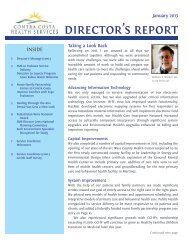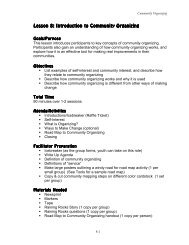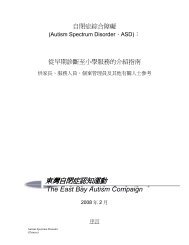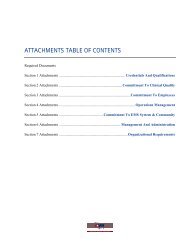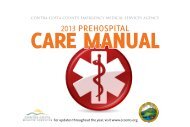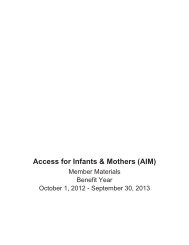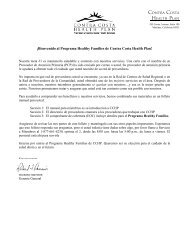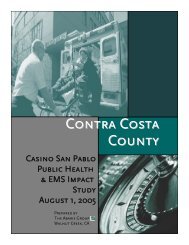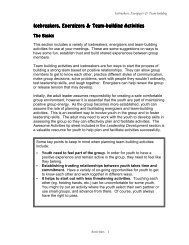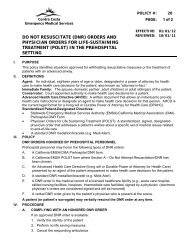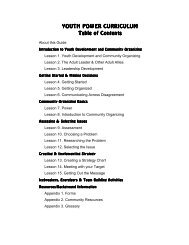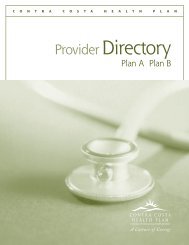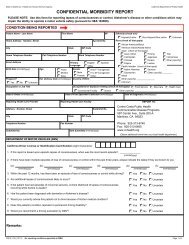EMS Policy Manual - Contra Costa Health Services
EMS Policy Manual - Contra Costa Health Services
EMS Policy Manual - Contra Costa Health Services
Create successful ePaper yourself
Turn your PDF publications into a flip-book with our unique Google optimized e-Paper software.
<strong>Contra</strong> <strong>Costa</strong><br />
Emergency Medical <strong>Services</strong><br />
DECLINING EMERGENCY MEDICAL CARE<br />
AND/OR TRANSPORT<br />
POLICY #: 10<br />
PAGE: 1 of 2<br />
EFFECTIVE: 07/01/12<br />
REVIEWED: 07/01/12<br />
I. PURPOSE<br />
To provide guidance to prehospital personnel in situations where the patient, or his/her legal<br />
representative, declines medical care or transport when care is recommended and felt to be<br />
necessary by the prehospital personnel attending that patient. All qualified persons are permitted to<br />
make decisions affecting his/her care, including the ability to decline care.<br />
II. DEFINITIONS<br />
A. Patient: Any person encountered by prehospital personnel who demonstrates any known or<br />
suspected illness or injury OR is involved in an event with significant mechanism that could<br />
cause illness or injury OR who requests care or evaluation.<br />
B. Competency: The ability to understand and to demonstrate an understanding of the nature of<br />
the illness/injury and the consequence of declining medical care.<br />
C. Qualified Person: A competent person making a decision for him/herself or another who is<br />
qualified by one of the following:<br />
1. An adult patient defined as a person who is at least 18 years old;<br />
2. A minor (under 18 years old) who qualifies based on one of the following conditions:<br />
A legally married minor;<br />
A minor on active duty with the armed forces;<br />
A minor seeking prevention or treatment of pregnancy or treatment related to sexual<br />
assault;<br />
A minor, 12 years of age or older, seeking treatment of contact with an infectious,<br />
contagious or communicable disease or sexually transmitted disease;<br />
A self-sufficient minor at least 15 years of age, living apart from parents and managing<br />
his/her own financial affairs;<br />
An emancipated minor (must show proof); OR,<br />
3. The parent of a minor child or a legal representative of the patient (of any age). Spouses<br />
or relatives cannot consent to or decline care for the patient unless they are legally<br />
designated representatives.<br />
III. PATIENT EVALUATION<br />
A. All potential patients encountered in the prehospital setting must be offered medical<br />
care/transport.<br />
B. Patients should be evaluated as much as capable and allowed.<br />
C. Qualified persons as defined above have the legal right to decline care or transportation.<br />
D. Qualified persons may limit the scope of their consent (e.g. may consent to transportation but<br />
not treatment, or consent only to certain treatments).<br />
E. Every reasonable attempt should be made to convince a patient or legal representative of the<br />
need for further medical evaluation and treatment, and he/she should be informed clearly of the<br />
risks and consequences of declining care. Resources to aid in the effort include family members<br />
and friends, law enforcement, and base hospital personnel.<br />
F. Prehospital personnel should not put themselves in danger by attempting to treat or transport<br />
patients who do not meet qualifications to decline care (not competent to decline care or not



